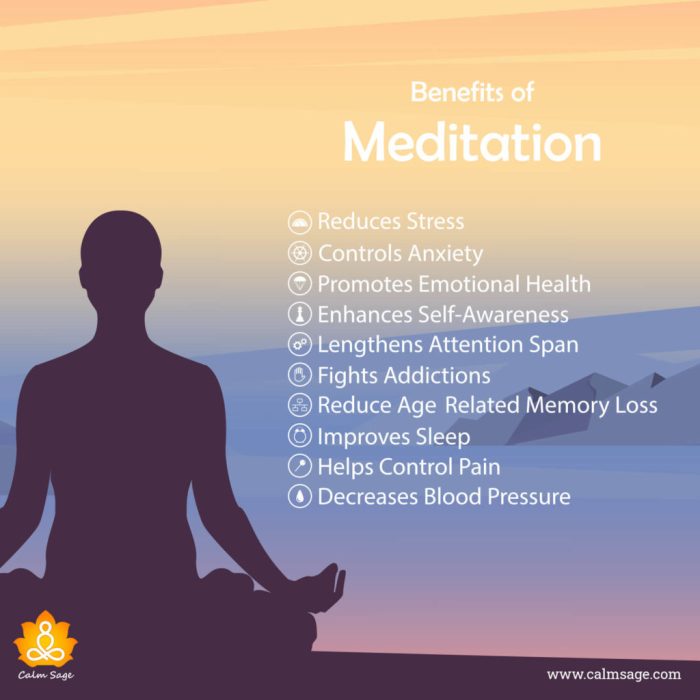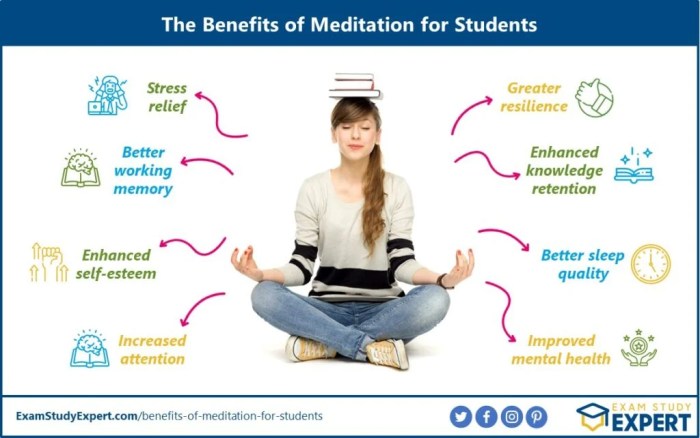12 Positive Effects of Meditation on Mental Health sets the stage for this enthralling narrative, offering readers a glimpse into a story that is rich in detail with pidi baiq author style and brimming with originality from the outset.
Meditation has been practiced for centuries, but its impact on mental health is still a topic of fascination. Discover the profound effects meditation can have on your mind and overall well-being as we delve into the 12 positive outcomes that await those who embrace this ancient practice.
Overview of Meditation

Meditation is a practice that involves focusing the mind and eliminating the stream of jumbled thoughts that may be crowding your mind and causing stress. The purpose of meditation is to achieve a state of mental clarity and emotional calmness. It can help you gain a better understanding of yourself, your thoughts, and your emotions.
Brief History of Meditation Practices
Meditation has a long history and has been practiced for thousands of years. It originated in ancient India and was initially a spiritual practice associated with Hinduism and Buddhism. Over time, meditation spread to various cultures and religions around the world, evolving into different forms and techniques.
Common Types of Meditation Techniques
- Mindfulness Meditation: Focuses on being present in the moment and observing thoughts and sensations without judgment.
- Transcendental Meditation: Involves the use of a mantra to achieve a deep state of relaxation and awareness.
- Loving-Kindness Meditation: Cultivates feelings of compassion and love towards oneself and others.
- Guided Meditation: Involves following the guidance of a teacher or recorded audio to lead you through a meditation practice.
- Body Scan Meditation: Focuses on systematically scanning and relaxing different parts of the body to promote relaxation.
Effects of Meditation on Mental Health

Meditation has numerous positive effects on mental health, helping individuals to achieve a sense of calm and clarity. Let’s explore 12 key benefits of meditation on mental well-being.
Reducing Stress and Anxiety
Meditation is known for its ability to reduce stress and anxiety levels in individuals. By practicing mindfulness and focusing on the present moment, meditation helps to calm the mind and alleviate feelings of stress and anxiety.
Improving Focus and Concentration
Meditation can significantly enhance focus and concentration levels. Through regular meditation practice, individuals can train their minds to stay present and focused, leading to improved concentration in daily tasks and activities.
Physiological Benefits of Meditation
Meditation not only has a positive impact on mental health but also offers numerous physiological benefits. Let’s delve into how meditation affects the brain, nervous system, sleep patterns, and symptoms of depression.
Impact on the Brain and Nervous System
Meditation has been shown to have a profound impact on the brain and nervous system. Studies have indicated that regular meditation practice can lead to structural changes in the brain, including increased grey matter density in areas associated with memory, learning, and emotional regulation. Additionally, meditation has been found to reduce the activity of the amygdala, the part of the brain responsible for the fight-or-flight response, resulting in decreased stress levels and improved emotional well-being.
Promoting Better Sleep Patterns
One of the common physiological benefits of meditation is its ability to promote better sleep patterns. By calming the mind and reducing stress and anxiety, meditation can help individuals fall asleep faster and improve the quality of their sleep. Regular meditation practice has been linked to a decrease in insomnia symptoms and an overall improvement in sleep quality, leading to better overall health and well-being.
Reducing Symptoms of Depression
Meditation has also been found to play a significant role in reducing symptoms of depression. Research suggests that meditation can help regulate mood and improve emotional stability by increasing levels of serotonin, the neurotransmitter associated with happiness and well-being. By cultivating mindfulness and self-awareness through meditation, individuals can better manage and alleviate symptoms of depression, providing a natural and holistic approach to mental health care.
Emotional Well-being and Meditation
Meditation has been shown to have a profound impact on emotional well-being, helping individuals enhance their emotional regulation, develop self-awareness, and build emotional resilience.
Enhanced Emotional Regulation
- Meditation practices, such as mindfulness meditation, can help individuals regulate their emotions by increasing awareness of their thoughts and feelings.
- Through regular meditation, individuals can learn to observe their emotions without reacting impulsively, leading to better control over their responses to challenging situations.
- Research has shown that meditation can reduce emotional reactivity and improve emotional regulation skills over time.
Mindfulness Meditation and Self-Awareness
- Practicing mindfulness meditation involves focusing on the present moment without judgment, which can enhance self-awareness by helping individuals become more attuned to their thoughts, emotions, and bodily sensations.
- By cultivating self-awareness through meditation, individuals can gain insights into their emotional patterns, triggers, and reactions, leading to greater emotional intelligence and self-understanding.
- Studies have demonstrated that mindfulness meditation can increase self-awareness and promote emotional well-being by fostering a deeper connection with one’s inner experiences.
Overall Emotional Resilience
- Regular meditation practice has been linked to increased emotional resilience, allowing individuals to bounce back more effectively from stress, setbacks, and challenges.
- By cultivating a sense of inner calm and equanimity through meditation, individuals can build emotional strength and adaptability in the face of adversity.
- Research suggests that meditation can enhance emotional resilience by reducing perceived stress, anxiety, and negative emotions while promoting positive emotional states and well-being.
Social Benefits of Meditation
Meditation not only has positive effects on mental and physical health but also plays a significant role in improving social interactions and relationships. By cultivating mindfulness and awareness, individuals who practice meditation can experience several social benefits.
Enhanced Empathy and Compassion
Meditation has been shown to increase empathy and compassion towards others. Through practices such as loving-kindness meditation, individuals can develop a greater sense of understanding and connection with those around them. This leads to more meaningful and supportive relationships in both personal and professional settings.
Fosters Connectedness with Others
One of the key social benefits of meditation is the sense of connectedness it fosters with others. By being present in the moment and developing a deeper understanding of oneself, individuals are better able to relate to and empathize with those they interact with. This sense of connectedness promotes a more positive and harmonious social environment.
Cognitive Effects of Meditation
Meditation has been shown to have numerous positive effects on cognitive abilities, including memory, learning, decision-making skills, creativity, and problem-solving abilities. Let’s explore how meditation can enhance these cognitive functions:
Memory and Learning:
- Meditation has been found to improve working memory, which is crucial for learning and retaining new information.
- Regular practice of meditation can enhance concentration and focus, leading to better information processing and retention.
- By reducing stress and anxiety, meditation creates a conducive environment for optimal cognitive functioning, allowing for improved memory recall and learning efficiency.
Decision-making Skills:
- Through mindfulness meditation, individuals can develop greater clarity of thought and enhanced decision-making abilities.
- By cultivating awareness of thoughts and emotions, meditation helps individuals make more informed and rational decisions, free from impulsive reactions.
- Regular practice of meditation can improve cognitive flexibility, enabling individuals to consider multiple perspectives and options before making decisions.
Creativity and Problem-solving Abilities:
- Meditation encourages divergent thinking, which is essential for fostering creativity and generating innovative ideas.
- By quieting the mind and reducing mental clutter, meditation allows for enhanced problem-solving abilities and the ability to think outside the box.
- Through mindfulness practices, individuals can tap into their subconscious mind, unlocking hidden insights and creative solutions to challenges.
Physical Health Benefits of Meditation

Meditation not only has positive effects on mental health but also offers numerous benefits for physical well-being. Let’s delve into how meditation can improve physical health.
Lowering Blood Pressure and Improving Cardiovascular Health
- Meditation has been shown to reduce blood pressure levels, which can help lower the risk of heart disease and improve overall cardiovascular health.
- By calming the mind and reducing stress, meditation can help regulate heart rate and improve blood circulation throughout the body.
- Regular practice of meditation techniques, such as mindfulness meditation or loving-kindness meditation, can have a significant impact on maintaining healthy blood pressure levels.
Impact of Meditation on Immune System Function, 12 Positive Effects of Meditation on Mental Health
- Studies have demonstrated that meditation can boost immune system function by reducing stress hormones that can weaken the immune response.
- By promoting relaxation and reducing inflammation in the body, meditation can enhance the body’s ability to fight off infections and illnesses.
- Practicing meditation regularly can help strengthen the immune system over time, leading to better overall health and well-being.
Reducing Inflammation in the Body
- Chronic inflammation is linked to various health conditions, including heart disease, diabetes, and autoimmune disorders.
- Meditation has been found to reduce inflammation in the body by lowering stress levels and promoting a state of relaxation.
- Through practices like deep breathing and body scan meditation, individuals can help reduce inflammation markers in their body and improve overall physical health.
Meditation Practices for Beginners: 12 Positive Effects Of Meditation On Mental Health

Starting a meditation practice can be intimidating for beginners, but with the right guidance and resources, it can become a rewarding journey towards mental well-being. Here are some tips and recommendations to help you get started:
Tips for Beginners
- Start with short sessions: Begin with just 5-10 minutes of meditation to build consistency and avoid feeling overwhelmed.
- Find a comfortable space: Choose a quiet and peaceful area where you can sit or lie down without distractions.
- Focus on your breath: Use your breath as an anchor during meditation to stay present and calm the mind.
- Be patient with yourself: It’s normal to have wandering thoughts, acknowledge them without judgment and gently bring your focus back to the present moment.
- Experiment with different techniques: Explore various meditation styles such as mindfulness, loving-kindness, or body scan to find what resonates with you.
Common Challenges and How to Overcome Them
- Restlessness and distractions: If you find it hard to sit still, try walking meditation or guided sessions to stay focused.
- Difficulty quieting the mind: Practice acceptance and patience, understanding that it takes time to cultivate a calm mental state.
- Inconsistency: Set a regular schedule for meditation and start with small achievable goals to build a sustainable practice.
- Feeling frustrated: Remember that meditation is a skill that improves with practice, be kind to yourself and celebrate small victories.
Recommended Resources for Guided Meditation
- Headspace: An app offering guided meditation sessions for beginners with various themes and durations.
- Calm: Provides mindfulness meditation exercises, sleep stories, and relaxation techniques to support mental well-being.
- Insight Timer: A platform with a vast library of free guided meditations, music tracks, and talks by meditation teachers.
- YouTube Channels: Explore channels like The Honest Guys, Boho Beautiful, or Yoga with Adriene for guided meditation videos.
Ultimate Conclusion
As we conclude our exploration of the 12 positive effects of meditation on mental health, it’s evident that this transformative practice offers a multitude of benefits for the mind, body, and spirit. Embrace the power of meditation and unlock a world of inner peace and well-being.